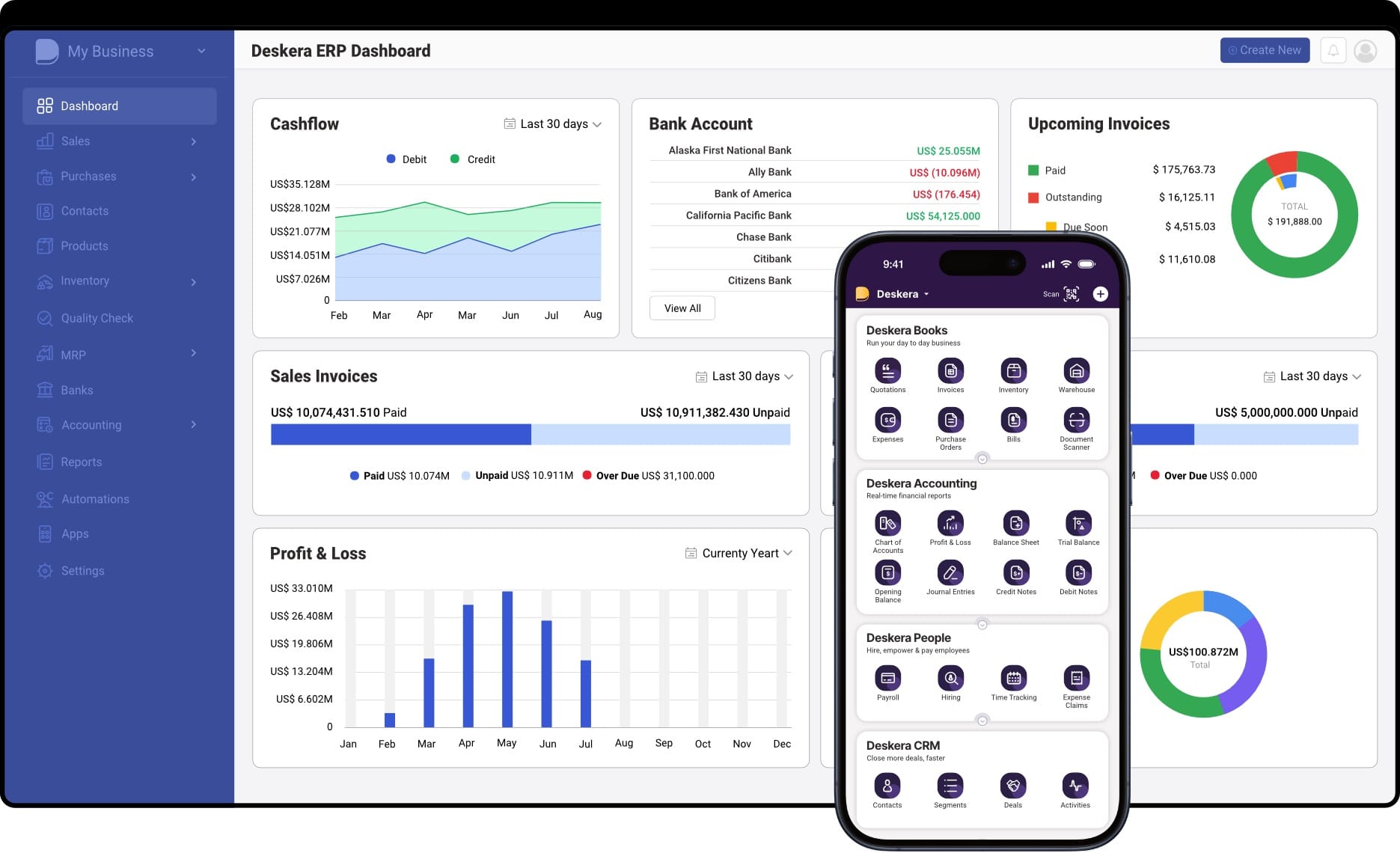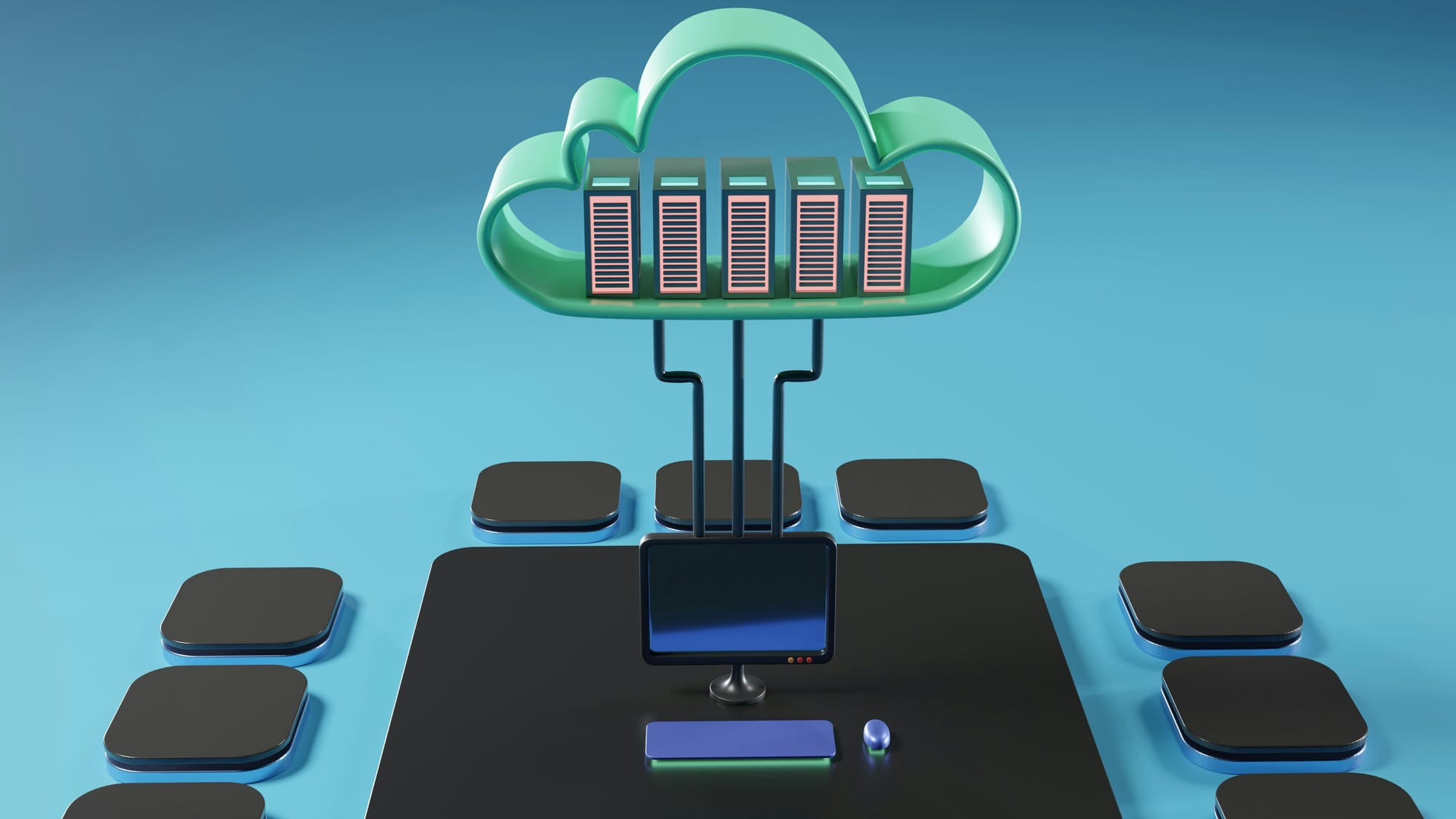In today’s fast-paced business environment, staying competitive means embracing technologies that deliver agility, scalability, and real-time visibility. Cloud-based Enterprise Resource Planning (ERP) systems have emerged as one of the most transformative tools for modern organizations.
With businesses increasingly shifting to digital-first models, cloud ERP offers a centralized, flexible, and future-ready solution to manage everything from finance to supply chain operations. As we move into 2025, the momentum behind cloud ERP adoption shows no signs of slowing down.
According to recent market research, the global ERP market is projected to grow from USD 87.73 billion in 2024 to USD 172.74 billion by 2029, nearly doubling in value within just five years.
What’s even more telling is that over 53% of organizations with ERP software have already transitioned to cloud-based solutions—a clear indication that cloud is becoming the default choice for ERP deployment.
From startups to large enterprises, companies are recognizing the strategic benefits that come with ditching outdated on-premise systems in favor of cloud ERP platforms.
The shift isn’t just about modernization—it’s about enabling smarter decision-making, enhancing collaboration, and reducing operational inefficiencies. Cloud ERP systems empower teams with real-time access to data, automated workflows, and seamless integration across departments. For decision-makers, this means faster insights and more confident choices in an increasingly complex business landscape.
One of the leading platforms helping businesses take this leap is Deskera ERP. Designed for growing businesses, Deskera offers an all-in-one cloud-based solution that covers accounting, inventory, CRM, payroll, and more.
With an intuitive interface, mobile accessibility, and built-in automation features, Deskera makes it easy for companies to streamline operations and scale without the need for heavy IT infrastructure.
As you explore the top 15 reasons to move to cloud ERP in 2025, Deskera stands out as a modern, affordable, and powerful choice for businesses ready to evolve.
What is Cloud ERP and What Makes It Stand Out?
Cloud ERP (Enterprise Resource Planning) is a software solution hosted on remote servers and delivered via the internet, allowing businesses to access critical systems and data in real-time from any location.
Unlike traditional on-premise ERP systems that require physical infrastructure and manual updates, cloud ERP is maintained and updated by the vendor, offering a more flexible, scalable, and cost-effective approach to enterprise management.
At its core, cloud ERP integrates various business processes—such as accounting, inventory, sales, procurement, HR, and customer relationship management—into a unified system.
This centralization helps eliminate data silos, reduces duplication, and ensures that teams are working with accurate, real-time information across departments.
Here are some key features that define a robust cloud ERP system:
- Real-Time Access: Users can access data and dashboards from anywhere, on any device with internet connectivity.
- Automatic Updates: The software is regularly updated by the provider, ensuring access to the latest features and security patches.
- Scalability: Easily add new users, modules, or capabilities as your business grows—without overhauling infrastructure.
- Integrated Modules: All core business functions are seamlessly connected, enabling end-to-end visibility and process automation.
- Data Security and Compliance: Leading cloud ERP providers offer advanced security protocols, encryption, and compliance with international standards.
- Lower Upfront Costs: Subscription-based pricing eliminates the need for heavy initial capital investment in hardware or licenses.
- Mobile Accessibility: Many cloud ERP platforms offer mobile apps, enabling remote work and decision-making on the go.
- AI and Automation: Built-in intelligent tools help automate routine tasks and provide predictive insights.
By combining these features, cloud ERP delivers a powerful, streamlined experience that adapts to the needs of modern businesses—whether they’re local startups or global enterprises.
Cloud ERP vs. On-Premise ERP: A Clear Comparison
When choosing an ERP system, one of the most crucial decisions businesses face is whether to go with a cloud-based or on-premise solution. While both systems aim to streamline business processes, their deployment, cost structure, and overall flexibility differ significantly.
Here’s a side-by-side comparison to help you understand the key differences:
In summary, cloud ERP is ideal for businesses seeking flexibility, fast deployment, and lower upfront investment, while on-premise ERP may still appeal to enterprises needing full control over their infrastructure and highly customized systems.
However, with advancements in cloud security, integration capabilities, and mobile accessibility, more companies are making the shift to cloud ERP—especially as digital transformation becomes a top strategic priority.
Top 15 Reasons to Adopt Cloud ERP in 2025
As businesses look toward a future shaped by digital transformation, Cloud ERP systems stand out as essential tools that can streamline operations, reduce costs, and future-proof organizations.
Unlike traditional on-premise solutions, cloud-based ERP offers flexibility, scalability, and security that are crucial in today’s fast-paced business environment.
1. Lower Upfront and Operating Costs
One of the most compelling reasons to switch to cloud ERP is the significant reduction in upfront and operating costs. Traditional on-premise ERP solutions require substantial investments in servers, hardware, IT staff, and software licenses. Cloud ERP, on the other hand, operates on a subscription model, which eliminates hefty initial expenditures and turns them into manageable monthly or annual costs.
This pay-as-you-go pricing allows businesses, especially small and medium-sized enterprises (SMEs), to access enterprise-level software without the capital-intensive burden.
Additionally, ongoing maintenance and updates are handled by the cloud provider, meaning businesses no longer need to allocate internal resources to managing upgrades, reducing operational costs further. This shift in cost structure frees up capital for other areas, allowing for improved budgeting and financial planning.
2. Faster Implementation Time
Cloud ERP systems typically offer faster implementation compared to their on-premise counterparts. Whereas traditional ERP systems can take up to a year or more to deploy due to the need for on-site infrastructure, configuration, and testing, cloud-based solutions can be implemented in a matter of weeks or a few months.
This speed of deployment significantly reduces the time-to-value, allowing businesses to start reaping the benefits of the system sooner. Additionally, many cloud ERP providers offer pre-configured templates for various industries, which further accelerates the setup process.
This shorter implementation time translates into quicker ROI, with businesses seeing immediate improvements in efficiency and operational visibility. Fast implementation also allows businesses to stay agile, adapting more quickly to changing market conditions or evolving business needs.
3. Seamless Automatic Updates
One of the key advantages of cloud ERP is its ability to deliver seamless, automatic updates without disrupting business operations. Unlike traditional ERP systems, which require manual updates, patches, and upgrades—often involving significant downtime—cloud ERP vendors handle this process in the background.
These updates typically occur on a quarterly or bi-annual basis, ensuring that your system is always running the latest version with new features, security enhancements, and compliance updates. This eliminates the risk of using outdated software that may leave the business vulnerable to cyber threats or regulatory non-compliance.
Moreover, businesses can rest easy knowing they are benefiting from continuous improvements, as cloud ERP vendors are incentivized to keep innovating and offering value to stay competitive.
4. Unmatched Scalability
Cloud ERP systems provide unmatched scalability, making it easy for businesses to adjust their systems as they grow or scale down operations. Unlike on-premise ERP solutions, which require additional infrastructure and complex configurations to handle increased workloads, cloud ERP allows businesses to simply increase or decrease their service usage as needed. Whether it’s adding more users, increasing storage capacity, or adding new functionalities, cloud ERP systems scale effortlessly to match business growth.
This scalability is especially beneficial for companies experiencing seasonal fluctuations, mergers, or expansions into new markets. With cloud ERP, businesses no longer have to worry about outgrowing their system or facing limitations due to hardware constraints. The flexibility to scale ensures that your ERP system can evolve alongside your business needs, supporting long-term growth.
5. Enterprise-Level Security
Security is a top priority for any business, and cloud ERP systems offer enterprise-level security that often surpasses what most businesses can implement on their own.
Cloud providers invest heavily in security infrastructure, including advanced encryption, firewalls, and multi-factor authentication, to protect data from unauthorized access and breaches.
In addition, most cloud ERP vendors comply with industry-standard security certifications such as ISO 27001, SOC 2, and GDPR, ensuring that your data is not only safe but also handled in accordance with global regulations.
Moreover, these cloud providers operate in data centers that employ physical security measures like biometric access controls and surveillance, further safeguarding your business’s sensitive information.
With cloud ERP, businesses can trust that their data is protected by the highest standards of security, offering peace of mind and mitigating the risk of costly data breaches.
6. Enhanced Compliance and Regulation Management
In today’s highly regulated business landscape, maintaining compliance is essential for avoiding legal penalties and maintaining a good reputation. Cloud ERP systems are designed to help businesses stay compliant with industry regulations, including financial, data protection, and environmental laws.
These systems come equipped with built-in compliance features that help track regulatory changes and automatically update workflows and documentation accordingly.
For example, cloud ERP can assist with meeting compliance requirements for standards such as GDPR, SOX, HIPAA, and others by providing automated audit trails, secure document management, and data encryption features.
Furthermore, cloud ERP systems are regularly updated to accommodate changes in regulations, ensuring that your business remains compliant without requiring extensive manual intervention. This proactive approach to compliance reduces the risk of errors and penalties, while also ensuring transparency in your operations.
7. Anywhere, Anytime Access
Cloud ERP systems offer the flexibility to access your business data and processes from anywhere, at any time, as long as there is an internet connection. This is a significant advantage, especially in today’s increasingly mobile and remote work environments. Whether you’re on a business trip, working from home, or in the office, you can access the same data and insights in real time.
This enhances productivity by enabling executives, managers, and employees to make data-driven decisions and collaborate without the need for physical presence.
Furthermore, cloud ERP systems are optimized for mobile devices, ensuring that users have the same functionality and usability on their smartphones and tablets as they would on a desktop computer. This level of accessibility promotes greater flexibility and responsiveness, contributing to a more agile and dynamic business environment.
8. Increased Reliability and Uptime
One of the most important factors in choosing an ERP system is reliability. Cloud ERP solutions typically offer higher uptime compared to on-premise systems, with most providers guaranteeing 99.9% or higher uptime.
This level of reliability is made possible by the robust infrastructure of cloud providers, which employ advanced techniques such as load balancing, automatic failover, and redundant power supplies to ensure continuous service.
In addition, cloud ERP vendors use geographically dispersed data centers to mitigate the risk of local outages affecting business operations. This means that even if one data center experiences a failure, your business can continue to operate smoothly with minimal disruption.
The high level of reliability in cloud ERP systems ensures that your business can rely on consistent access to critical applications and data without worrying about downtime or system failures.
9. Built-In Disaster Recovery
Disaster recovery is an often-overlooked but crucial aspect of any ERP system. Cloud ERP solutions come with built-in disaster recovery features, ensuring that your data and operations are protected in the event of a disaster, whether it’s a natural disaster, cyberattack, or system failure.
Data is automatically backed up in multiple locations, allowing for rapid recovery in case of data loss or service interruption. Cloud providers have robust recovery protocols in place, often with service level agreements (SLAs) that guarantee quick restoration times, minimizing downtime and data loss.
This built-in disaster recovery plan is an essential component for businesses that want to ensure business continuity without investing in complex and expensive on-premise backup systems. With cloud ERP, companies can rest assured knowing their critical data and systems are protected, even in worst-case scenarios.
10. Real-Time Data and Analytics
Cloud ERP systems centralize data from all departments—finance, operations, supply chain, HR—into a single platform, enabling real-time data access and analytics. This centralization allows for quicker, more accurate decision-making, as leaders and teams can access up-to-date information from all areas of the business.
With the help of integrated reporting tools and dashboards, users can track key performance indicators (KPIs), monitor trends, and identify opportunities or areas for improvement in real time. This access to live data ensures that businesses can react quickly to changing market conditions, adjust operations, and identify problems before they become critical.
Moreover, cloud ERP systems offer advanced data analytics capabilities, including predictive analytics and data visualization, which can help businesses gain deeper insights into their operations and make strategic decisions based on solid, data-driven foundations.
11. Better Collaboration Across Teams
Cloud ERP systems foster better collaboration across different departments by providing a unified platform where teams can access and share real-time data. Unlike traditional systems that may operate in silos, cloud-based solutions break down these barriers, enabling employees from finance, sales, HR, and operations to work together more efficiently.
Whether it's sharing reports, updating project statuses, or collaborating on inventory management, cloud ERP ensures that everyone has access to the same information, promoting a collaborative environment.
This integrated approach reduces communication gaps, minimizes errors, and accelerates decision-making. Additionally, cloud ERP can facilitate remote collaboration, allowing teams to work together seamlessly even if they’re in different geographical locations, improving both efficiency and productivity.
12. Enhanced Customer Experience
Cloud ERP systems contribute to a better customer experience by providing companies with accurate, up-to-date customer data that can be accessed anytime and anywhere. With cloud ERP, businesses can track orders, manage customer inquiries, and address issues in real time, offering faster and more personalized services.
The system allows for a 360-degree view of customer interactions, from sales to service, which improves communication and ensures a consistent experience across all touchpoints. By automating key processes, such as order fulfillment, invoicing, and customer support, cloud ERP helps companies deliver faster, more accurate responses to customer needs.
As a result, businesses can build stronger relationships with their customers, enhance satisfaction, and improve customer retention rates.
13. Integration with Other Systems
Cloud ERP systems provide seamless integration with a wide range of third-party applications, including CRM systems, eCommerce platforms, HR software, and supply chain management tools. This ability to integrate various business functions into a single cohesive ecosystem reduces the need for manual data entry and ensures consistency across different platforms.
Whether it’s connecting with an external payment processor, syncing inventory data with an eCommerce store, or integrating with a marketing automation tool, cloud ERP simplifies these processes. This integration ensures that data flows smoothly between systems, eliminating discrepancies and allowing for more informed decision-making.
Additionally, cloud ERP's ability to integrate with emerging technologies, such as AI and IoT, opens up opportunities for further automation and innovation within the organization.
14. Improved Supplier and Vendor Management
Cloud ERP can enhance supplier and vendor relationships by offering real-time data on inventory, orders, deliveries, and payments.
By using cloud-based tools, businesses can streamline their procurement processes, track supplier performance, and identify cost-saving opportunities. Supplier and vendor data is centralized, making it easier to manage contracts, track lead times, and monitor product quality.
Additionally, cloud ERP’s reporting capabilities allow businesses to assess supplier performance based on metrics such as delivery times, order accuracy, and cost efficiency. This level of visibility empowers companies to make data-driven decisions when selecting suppliers, negotiate better terms, and identify opportunities for collaboration or improvement.
Ultimately, improved supplier and vendor management leads to cost reductions, better service levels, and more reliable partnerships.
15. Future-Proofing Your Business
Adopting cloud ERP helps future-proof your business by ensuring that your operations are continuously updated with the latest technology and best practices.
As industries evolve and new challenges emerge, cloud ERP vendors invest in innovations like artificial intelligence, machine learning, and automation to stay competitive. By using a cloud ERP system, businesses can take advantage of these advancements without the need for expensive, disruptive upgrades.
Additionally, cloud ERP offers businesses the flexibility to adapt to new industry regulations, market trends, and customer demands. Since cloud-based systems are inherently scalable, they allow companies to expand their operations globally, enter new markets, and explore new business models with minimal IT overhead.
In this way, cloud ERP equips businesses with the tools to thrive in an increasingly digital and fast-changing world, ensuring long-term sustainability and growth.
Finding a Cloud ERP Provider
Choosing the right cloud ERP provider is a critical step in streamlining your operations and ensuring long-term success. Here are the key considerations to guide your selection process:
- Assess Your Business Needs: Clearly define which ERP modules you require—such as finance, inventory, CRM, HR, or manufacturing planning—to avoid overspending on unnecessary features.
- Check Industry Experience: Select a vendor with a proven track record in your industry. Look for case studies, client testimonials, or references to validate their expertise.
- Evaluate Scalability: The ERP system should accommodate your business growth, both in terms of user volume and feature expansion.
- Look for Accessibility: Ensure the ERP offers easy access across devices and supports remote working capabilities.
- Prioritize Security and Compliance: The provider should meet data security standards like GDPR, SOC 2, or ISO 27001 to protect your sensitive information.
- Compare Pricing Models: Understand the pricing structure—whether it’s based on users, modules, or usage—to make an informed financial decision.
- Ask for a Demo or Trial: Evaluate the user interface, system performance, and functionality through a hands-on demo or free trial.
- Support and Updates: Choose a provider with reliable customer service and a track record of timely software updates and bug fixes.
- Integration Capabilities: Ensure the ERP integrates smoothly with your existing tools, such as accounting software, eCommerce platforms, or CRM systems.
- Cloud Hosting Reliability: Inquire about the provider’s uptime guarantees, data backup processes, and disaster recovery plans to ensure business continuity.
Strategies for Successfully Implementing Cloud ERP
Implementing a cloud ERP system can transform your business operations—but only if executed properly. A structured, strategic approach ensures a smooth rollout, minimizes disruption, and maximizes ROI.
Here are key strategies for successful cloud ERP implementation:
- Define Clear Objectives: Identify what you want to achieve—such as improved data visibility, automated workflows, or faster reporting—to guide the implementation process and measure success.
- Assemble a Cross-Functional Team: Involve stakeholders from finance, operations, IT, HR, and other departments to ensure the system meets company-wide needs and gains user buy-in.
- Choose the Right Implementation Partner: Work with an experienced ERP vendor or consultant who understands your industry and can provide guidance throughout the process.
- Conduct Thorough Data Migration Planning: Cleanse, organize, and map your data accurately before migration to avoid errors and ensure continuity after go-live.
- Prioritize User Training and Change Management: Train users early and often. Offer hands-on workshops and documentation to reduce resistance and increase adoption rates.
- Establish a Realistic Timeline: Break the project into manageable phases with clear milestones and deadlines. Avoid rushing the process to prevent costly errors.
- Monitor Key Performance Indicators (KPIs): Track metrics like system uptime, user adoption, error rates, and operational efficiency to evaluate progress and performance.
- Ensure System Customization Aligns with Business Goals: Customize features only when necessary to reduce complexity and simplify upgrades and maintenance in the future.
- Test Extensively Before Going Live: Conduct thorough system and user acceptance testing (UAT) to identify and fix issues before full-scale deployment.
- Plan for Post-Implementation Support: Set up ongoing technical support, updates, and feedback loops to ensure continuous improvement and long-term success.
How Deskera ERP Empowers Your Business Operations
Deskera ERP is an all-in-one cloud-based solution designed to simplify and optimize core business functions—ideal for small to midsize enterprises. Here's how it can help your organization thrive:

- Centralized Business Management: Manage accounting, inventory, CRM, HR, and payroll in one platform—eliminating the need for multiple disjointed systems.
- Real-Time Financial Insights: Get up-to-date financial reports, balance sheets, and cash flow statements to make informed decisions quickly.
- Automated Inventory Management: Track stock levels, manage product batches, set reorder points, and reduce carrying costs with real-time inventory data.
- Advanced MRP and Production Planning: Plan manufacturing processes, manage bill of materials (BOM), track work orders, and schedule production efficiently.
- AI Assistant (David): Leverage built-in AI to get suggestions, generate reports, and streamline data analysis without technical know-how.
- Integrated Sales and CRM Tools: Track leads, manage pipelines, issue quotes, and close deals seamlessly with built-in CRM features.
- Mobile Accessibility: Access your ERP system anytime, anywhere through Deskera’s mobile app—perfect for managing a remote or distributed workforce.
- Pre-Built Templates and Reports: Save time with ready-made templates for invoices, purchase orders, financial statements, and compliance reports.
- GST & Tax Compliance: Stay compliant with local tax regulations like GST, VAT, and TDS—Deskera automatically calculates and files returns.
- Scalable and Cost-Effective: With flexible pricing plans, Deskera grows with your business—making it a smart investment for startups and growing companies alike.
Key Takeaways
- Cost Efficiency: Cloud ERP reduces upfront capital costs and ongoing IT maintenance expenses, offering a predictable subscription-based pricing model.
- Scalability and Flexibility: Easily scale your operations up or down based on business needs without investing in additional hardware or infrastructure.
- Real-Time Data Access: Make faster, data-driven decisions with access to real-time insights from anywhere at any time.
- Improved Collaboration: Cloud ERP fosters team collaboration with centralized data, allowing departments to work seamlessly across locations.
- Automatic Updates and Maintenance: Enjoy regular feature updates, security patches, and system improvements without manual intervention or downtime.
- Enhanced Security: Leading cloud ERP providers offer enterprise-grade security protocols, data encryption, and compliance certifications.
- Disaster Recovery and Data Backup: Built-in disaster recovery ensures business continuity with automatic data backups and secure cloud storage.
- Faster Deployment: Implement cloud ERP quickly compared to traditional systems, reducing time-to-value and disruption.
- Mobile Accessibility: Access critical business information and perform key tasks on-the-go using ERP mobile apps.
- Customizable Integrations: Integrate with third-party apps, tools, and platforms to create a tailored tech ecosystem that fits your workflow.
- Support for Remote Workforces: Empower distributed teams to access systems securely from any location, enhancing flexibility and productivity.
- Sustainability and Green IT: Reduce your carbon footprint and contribute to sustainability goals by eliminating on-premise servers and reducing energy use.
- Regulatory Compliance: Stay compliant with evolving regulations and industry standards thanks to built-in tools and automatic updates.
- Competitive Advantage: Stay ahead of competitors by embracing digital transformation and improving agility, speed, and innovation.
- Future-Readiness: Cloud ERP sets the foundation for future growth, innovation, and the adoption of emerging technologies like AI and IoT.
Related Articles









